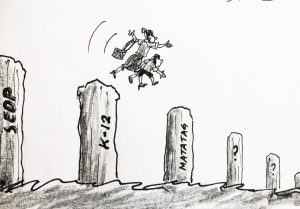The Department of Education (DepEd) has long been a cornerstone of the country’s efforts to nurture young minds and prepare them for the future. However, the department has also been plagued by frequent changes in leadership, causing constant shifts in the curriculum and leaving teachers and students caught in a whirlwind of confusion and adaptation.
When new secretaries take the helm, particularly those from different political parties, they often implement significant changes, ostensibly to leave their own mark. This political “come-and-go” culture within DepEd creates a cycle of instability that undermines the quality of education. Teachers get burdened with the constant need to adapt; students are left confused and disadvantaged; and the department as a whole loses a clear and consistent direction.
This revolving door of leadership resulting in the frequent overhaul of the curriculum cannot be helped. Each new secretary often seeks to distance themselves from the initiatives of their predecessors, sometimes prioritizing political objectives over educational continuity.
This results in a patchwork of policies that may not align with long-term educational goals. For teachers, this means constant retraining and a perpetual need to develop new materials. The relentless cycle of adaptation could erode the morale of educators, who are expected to adjust to new systems without adequate time or resources.
The students, the most critical stakeholders in the education system, bear the brunt of these frequent changes. Every time the curriculum shifts, students face the challenge of adjusting to new teaching methods and content, disrupting their learning process. The lack of consistency in their education not only confuses them but also hampers their ability to build on previous knowledge. This discontinuity can lead to gaps in learning, making it difficult for students to achieve the necessary competencies at each educational level. This compromises the quality of education and deprives the students of a stable and coherent learning experience.
The political motivations behind these curriculum changes often obscure the real purpose of education: to equip students with knowledge and skills for their future. When curriculum modifications are made to erase the legacies of political rivals rather than to improve educational outcomes, they reflect a misuse of power and resources. This politicization of education leads to a lack of clear direction and long-term planning within DepEd. As a result, the department fails to establish a cohesive vision for the country’s educational system, leaving it vulnerable to the whims of successive political administrations.
For the sake of the country’s future, DepEd should establish a more stable and apolitical approach to curriculum development, ensuring that education remains focused on the needs of students rather than the ambitions of politicians, as it fulfills its mission of nurturing the minds of the next generation.




